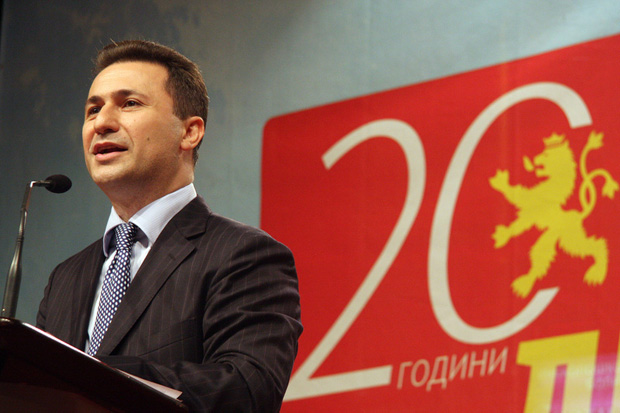
The government of Prime Minister Nikola Gruevski has been heavily criticised for the state of media freedom in Macedonia (Image Toni Arsovski/Demotix)
Media freedom in Macedonia has been deteriorating for some time. The latest case is the arrest of Zoran Bozinovski, the owner of website critical of the government, Burevesnik on espionage charges. Below, Tamara Causidis, President of the Trade Union of Macedonian Journalists and Media Workers and Dragan Sekulovski, the Executive Director of Association of Journalists of Macedonia, chronicles the challenges facing the free press, in their submission to the upcoming International Federation of Journalists conference in Kiev.
—
The media business in Macedonia has been increasingly under attack over the past few years. The EU and the US State Department, as well as renowned non-governmental organisations like Freedom House and Reporters Without Borders, have all called attention to the decline of media freedom in the country. The challenges most often highlighted include imprisoned journalists, restrictive draft media laws, the government’s large advertising share, the lack of transparent ownership, and the polarisation of the media along lines of political and business affiliation. In light of this, freedom of the media and freedom of speech have been marginalised.
Macedonia has almost 200 media outlets, but unfortunately, that does not make the situation better. They all compete in a small, distorted market, covering just over 2 million citizens, where they cannot survive financially unless they align their interests with the governing parties and politically connected, large businesses. Apart from state media, the vast majority of the country’s press is in private hands. However, the government come out top among the 50 biggest advertisers in the country in 2012. The latest European Commission report raised this as a serious concern, and the DG Enlargement report of June says that at least 1% of the annual national budget (20 million Euros) is invested in media outlets through government campaigns and advertising. This highlights the authorities’ huge influence in the media sphere. Bearing in mind that there are no criteria for how to distribute these funds, “governmental friendly” media outlets are favoured over others. Professionals are fired and people with personal integrity are replaced by obedient mouthpieces, while a huge number of journalists are living in professional insecurity. Behind the veil of “economic reasons”, critical media is vanishing.
One of the most striking example of the situation Macedonian media finds itself in, took place on 24 December last year. Journalists reporting on the parliamentary session were expelled from Parliament by security forces without any reasonable explanation. The Association of Journalists of Macedonia (AJM) used all national legal measures to fight this, but so far no public official has been held liable for this breach of Article 16 of the constitution, which guarantees citizens the right to objective information. The next step would be submission of an appeal to the Court in Strasbourg.
In April the government announced a draft media law, now in its final stages within Parliament, which has the potential to further negatively affect media independence and freedom of expression. International and local organisations are concerned about the same issues regarding the bill – the intention to have one regulator for all types of media and the powerful role of this regulator, the issues concerning political independence, sustainable financing and high and disproportionate fines for the media, as well as the messy attempt to adopt definition of a journalist. The main Council of Europe, OSCE and AJM recommendations have not been accepted. In fact, the latest version of the law was updated with amendments which makes the text even more restrictive the before. For instance, it envisaged that authorities to decide which national association of journalists is legitimate, and will have the right to nominate a member to the council of the regulator and the public broadcaster.
In October 2013 Macedonia became the only country in south-east Europe with imprisoned journalists. Tomislav Kezarovski, from the daily Nova Makedonija, was sentenced to four and a half years in prison for in 2008 revealing the identity of a protected witness in a murder trial. The witness recently testified that he had given false evidence against the accused killers. The Trade Union of Macedonian Journalists and Media Workers (SSNM) and AJM organised two protests in front of court in Skopje, raising the issue in the international community, but despite this Kezarovski was sentenced on October 21.
It should also be noted that at the time, he was investigating the mysterious death of prominent journalist Nikola Mladenov, founder of the weekly Fokus and one of the biggest activists for press freedom in the country. AJM is taking daily initiatives to raise the visibility of this case, to try to convince authorities that this sends terrifying message to all journalists and endangers freedom of press even more.
Finally, many colleagues in the media cannot rely on any of the basic rights guaranteed by the Labour Law. They are working without contracts, insurance, paid vacation, overtime hours and sick leave, and minimum wage is not regulated. There aren’t any internal rules or statutes defining the rights and obligations of owners, editors and journalists, and there are instances of both direct and indirect bans for organising into workers unions. The journalists themselves are barely educated about what a union is and how they can organise through it. In the face of fierce criticism from AJM, the government has developed the Macedonian journalists association, designed not only to diminish critics and open confrontation but also to impose artificial support for the proposed media laws.
This text is drafted based on a draft report on the media situation in Macedonia by Tamara Causidis, President of the Trade Union of Macedonian Journalists and Media Workers and Dragan Sekulovski, Executive Director of Association of Journalists of Macedonia. It will be published at the upcoming conference organised by the International Federation of Journalists in Kiev.
This article was originally published on 19 Nov 2013 at indexoncensorship.org





